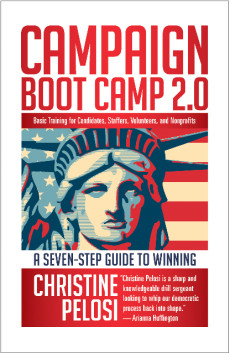Women Leaders: Consider Yourself Asked
Women often find it harder to make the leap into campaigns because many of us remain the primary caregivers for our children and our parents, so family time is harder to let go. And public attitudes remain stereotypical, even among close supporters. I remember receiving an award at the pre-Columbus Day luncheon of the Irish-Israeli-Italian Society of San Francisco during my days as a deputy prosecutor. There I was, my speech all lined up about the caring traditions of Trócaire, Tikkun Olam, and Caritas when a family friend approached my table announcing loudly, “I’m praying for your husband.” My response, thinking she mistook me for one of my married sisters: “It’s Christine; I don’t have a husband.” “I know,” she replied, “that’s why I am praying for him!” My colleagues roared with laughter. One who has since gone on to elected office herself said, “When people ask me where my husband is, I say, ‘I don’t know, but if you find him tell him I’m looking for him.’”
It’s not just pressure to have a family—it is pressure from a family member. More recently, two female candidates dealt with family pressure. One was starting her campaign when her mother asked her, “Who’ll take care of your children?” (Translation: “Not Grandma.”) The other got a call from home that her daughter’s response to mom contemplating a primary was to dye her hair “one of the primary colors.” (Translation: “Mom, stay home.”) These are quite legitimate issues—and ones we encounter every day. Primary caregivers of small children find that before we can accept any opportunity, our first question is about childcare. I traveled to over twenty states with my infant daughter, and each boot camp from halfway across my hometown to halfway around the world began with: “How will I care for Isabella?” One person asked me, “Why don’t you bring your nanny?” “I am the nanny,” I replied. Every primary caregiver has to answer that childcare question, so candidates must remember this is not a trick question, just a very public one.
A Brown University study addressed the issue of women candidates with a report that asked “Why Don’t Women Run for Office?”- The researchers found that women are less likely than men to have received the suggestion to run for office from party and elected officials, political activists, or family and friends; yet when women receive external support from formal and informal political and nonpolitical sources, they are twice as likely to run.7
Ellen Malcolm, founder of EMILY’s List, a national network of 100,000 members who recruit, train, and support Democratic pro-choice women candidates, says the Brown study shows that people who care about public service should encourage others to run. The theory behind EMILY’s List—EMILY stands for Early Money Is Like Yeast—is that early networking and institutional support helps the campaign “dough” rise. Malcolm says establishing a pipeline for women to run is essential because “progress doesn’t happen in a moment, but in battle after battle for our values.” Malcolm’s message to potential candidates: “Consider yourself asked.”8
This sentiment is echoed by Florida congressional candidate Annette Tadeo, now with the Women’s Campaign Fund, who explained during our joint presentation to the Florida Young Democrats, “Women are not asked to run. A woman with a PhD in education won’t run for School Board because she will think she is not qualified, but a man without that degree or kids in the school system will run. Because we need to encourage more women, the Women’s Leadership Fund site established www.Sheshouldrun.com for people to nominate people (or them- selves) to run.”9
These networks are essential as women candidates and opinion leaders find the environment changing as the novelty of female leaders wears off. The feminist Barbara Lee Family Foundation commissioned a poll to study voter attitudes and research female candidates’ campaigns. Some results are striking:
Follow Your Personal Code of Conduct
First and foremost, you have to be yourself. All too often, people will get into trouble when, rather than being confident in their service mission, they adapt their views to more experienced people’s in exchange for a possible advancement, endorsement, or contribution. Bad idea. Your stated values, ethics, and code of conduct should guide your behavior and your decisions on and off the campaign trail. First and foremost, you must be yourself and present the same call to service mission to everyone.
People may offer contributions to your organization, cause, or candidate, in exchange for a particular outcome. Stop the conversation. No contribution is worth your soul, much less your liberty and reputation. Other people may urge you to use negative information about the opposition or will tell unsavory details of their conversations with other people. A simple rule applies: “If they’ll do it for you, they’ll do it to you.” Once you ditch your old supporters for new friends, your new friends will know how little you value friendship and could ditch you on the same grounds. Think long and hard before you abandon your values, your friends, or your commitments.
When you undertake the leadership of a campaign, you become responsible for anything that goes out to the public. Establish clear ethical standards and expectations for practices such as fact- finding and fund-raising, and clear policies for endorsements, questionnaires, and Internet use—and stick to them.
Reprinted from the book Campaign Bootcamp 2.0 by Christine Pelosi, with the permission of Berrett-Koehler Publishers, Inc. 2012. www.bkconnection.com


